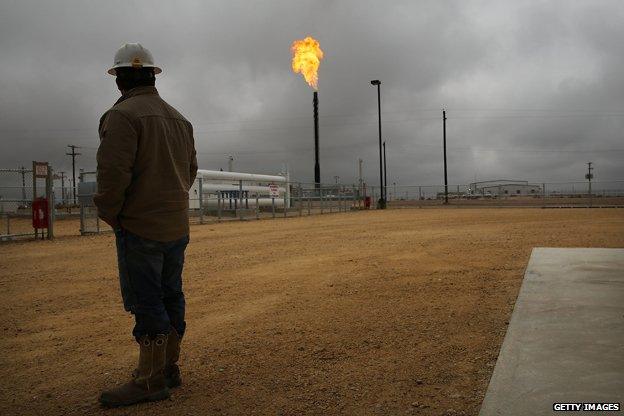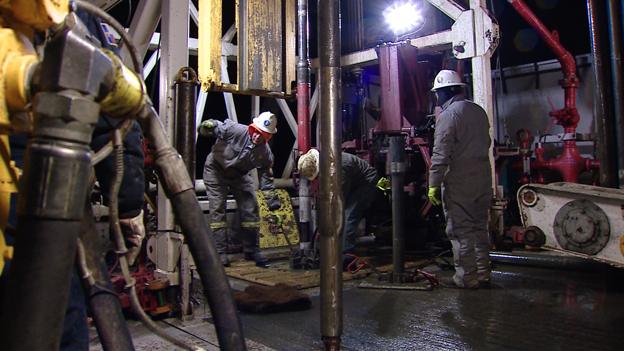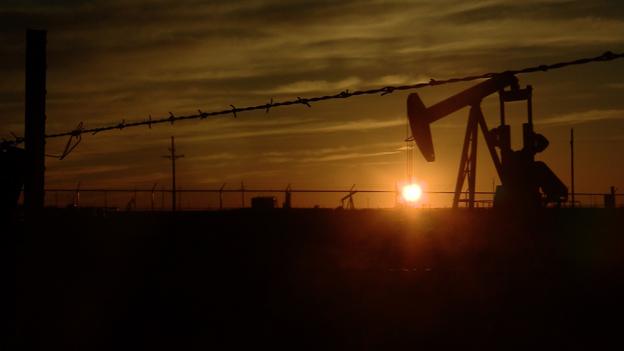Hard times for the Texas oil industry
- Published
- comments

The Texan oil industry has been hit hard by the recent downturn in prices, but the workers are undaunted.
When the plane door opened at the small, and slightly euphemistically named, Lubbock International airport in West Texas, there was a wonderful rush of warm air. It was 21 degrees outside, and though the winter sun was low in the sky, I had to peel off some of my east coast, winter Washington layers.
The terrain is flat. Featurelessly flat, and Texas was wearing its winter colours - all dull browns and watery greys. But the feeling of warm sun on the skin was very welcome.
But then the wind got up. And with no mountains or hills to block its advance, when a cold front comes in, it comes in fast. On the way out of town tumbleweed came bowling past our car faster than we were travelling. The temperature was plummeting. By the time we reached the town of Midland - the geological area known as the Permian basin, and epicentre of the fracking industry - the mercury was at zero, and the sweaters were back on.
In the space of a few hours we had gone from hot to freezing. The oil price has done just the same thing - with the same chilling effect for the thousands who work in the industry. This time last year oil was selling at more than $114 a barrel, now it's less than half that.
This is a global world we live in, and so a slowdown in Chinese demand, coupled with a Saudi stubbornness to keep production at the same levels, has led to thousands of Texan oil workers being laid off, and a vast numbers of wells being mothballed.
For various operational reasons we had to go and see them "fracking" in the middle of the night. The site was in the middle of nowhere and temperatures were now at bone-chilling levels. The place is dominated by what looks like a mini Eiffel tower. It reaches up into the sky illuminated by white, sodium lights.
Up close it is a muddy quagmire - water plays a vital part in the fracking process. It is injected into a pipe that goes deep down into the earth at phenomenally high pressure - 8,000lb per square inch, if you're asking - to crack open the rocks, permitting access to the oil that has hitherto been unreachable.

To achieve that pressure, on the site there is a row of enormous trucks with even bigger pumps on the back. When they start to rev up, the engines go from a low rumble to a high-pitched scream.
Next to the lorries is a trailer. And in this warm space sit a few guys, their eyes focused on a series of bewildering screens. They show how far the acid has penetrated, how much sand they are putting down the pipe and what pressure the water is moving at. Overseeing all of this is the master of ceremonies, one fabulously named Storm McDonald.
He is a burly Texan and has worked in oil fields all his life. He's spent three years drilling in North Dakota on the Canadian border. He's worked on the biggest oilfields around the United States doing every dirty job imaginable. But though he lacks the white gloves and a baton, he is now the conductor of this orchestra - and he's still only 30. Outside in the icy cold, men are wearing hard hats, goggles and headsets awaiting his instructions. It is gone one o'clock in the morning when we strike up our conversation - and though presumably somewhere there is a warm bed waiting for him, he is in clover. He loves what he does. Adores it. The smell of oil, the gush of oil, the riches that oil can sometimes bring - but also the hard, physical labour involved.

More from the Magazine
Half of the 10 fastest-growing cities in the US are in Texas, according to new figures. Why?
10 reasons why so many people are moving to Texas (August 2013), external

He tells me about the boom times - when every bar is heaving and every supermarket shelf is empty, when you have to drive for hours just to buy clothes or food because all the towns nearest to the oil boom have sold out of everything.
The company he's working has six sites - four have been closed, and when they complete the frack on this one the owner says the probability is that they won't pump the oil. They need the price to be at $80 a barrel to break even - and today the price is nowhere near that.
But Storm is philosophical. He says that although this downturn was unexpected, it will pass. He says that in this industry when the times are good, you put money away for when the times are bad - in other words, says Storm, this storm will quickly pass.

How to listen to From Our Own Correspondent, external:
BBC Radio 4: Saturdays at 11:30 and Thursdays at 11:02 GMT
Listen online or download the podcast.
BBC World Service: At weekends - see World Service programme schedule.
Subscribe to the BBC News Magazine's email newsletter to get articles sent to your inbox.